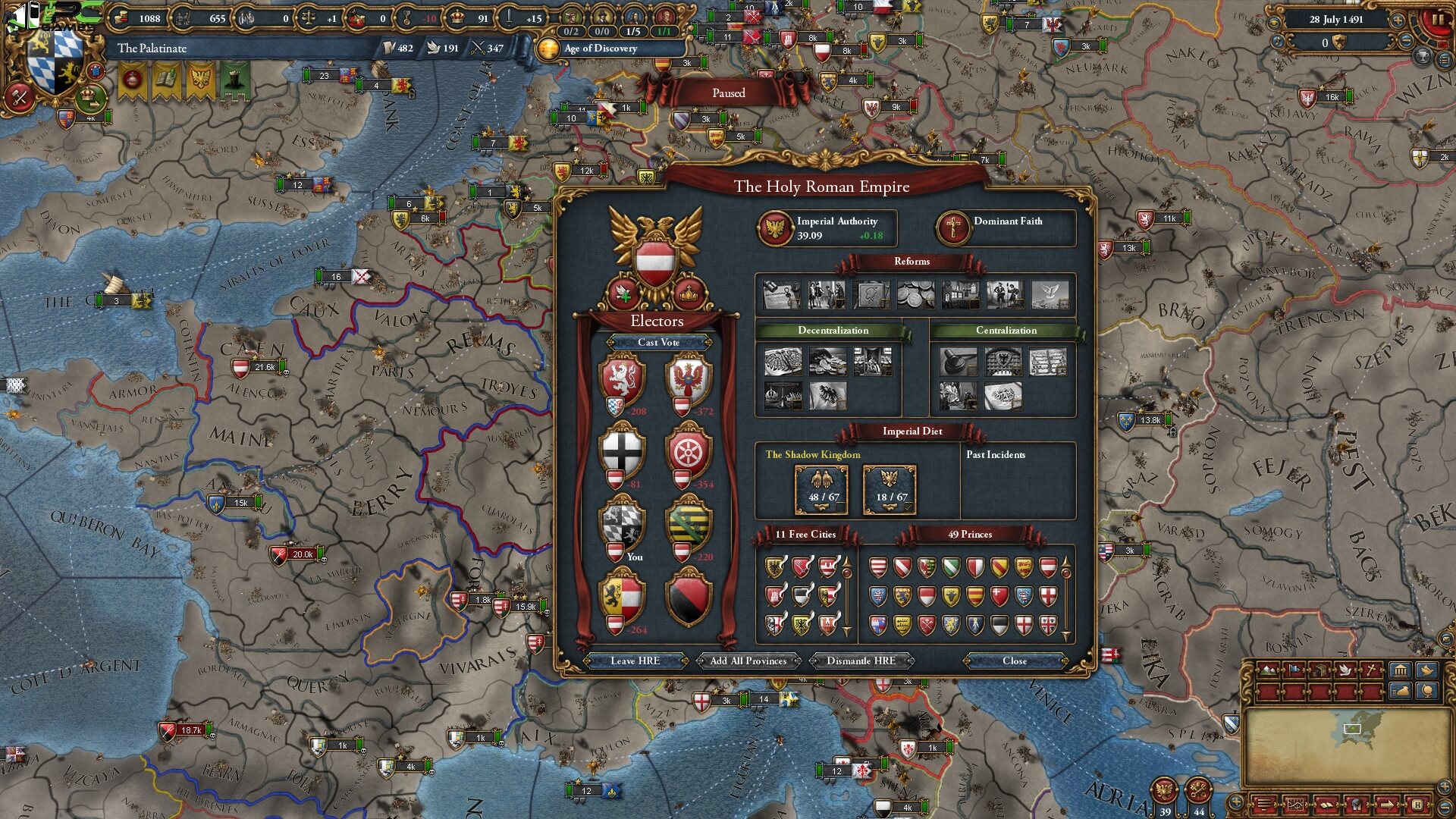If you know anything about me: you will know that depending on the day, Europa Universalis IV is my favorite game of all time. For those of you who don’t know: Europa Universalis IV is the fourth entry in the grand strategy series Europa Universalis. Developed by Paradox Development Studio and published by Paradox Interactive, the game released on August 13, 2013 for PC, Mac, and Linux.
In the game you control a nation from the Late Middle Ages through the Early Modern period (1444 to 1821 AD). You conduct trade, diplomacy, colonization, warfare, etc,. all on a deep and intricate level that only Paradox grand strategy games offer.
- Europa Universalis IV: Mandate of Heaven Steam key grants you access to an awesome DLC expansion so you could further enhance your experience in Europa Universalis IV, one of the most profound strategy title on the market! This expansion includes:. Four new historical ages. Golden Era feature. New and Updated Empires. Prosperity feature.
- Mandate of heaven adds a mechanic to ming similar to the HRE, where he needs to border his tributary. This will make him really strong as he can pass reforms but will obviosly limit his expansion. An Ai ming will almost never conquer much in a game.
But that’s enough gushing for one day, to the important stuff. Today, Paradox Interactive announced a new expansion titled Mandate of Heaven. According to Paradox, Mandate of Heaven enhances the game experience for playing the major nations of East Asia, especially Ming China, Japan, and the Manchu tribes.
One of centerpieces of Mandate of Heaven is managing the Celestial Empire, which will be handled similarly to how the Holy Roman Empire has been handled. In a press release, Paradox writes: “increase the power of your mandate by commanding tribute, then use your mandate to reform the imperial system, strengthening your grip on the Middle Kingdom and the continent as a whole. Embrace the meritocracy of China’s civil service to pass decrees that meet your empire’s immediate needs. Can you hold off challengers to your claim?”
Read more: Dynasties come and dynasties go, but China is eternal. An unbroken chain stretches through the millennia, and now this ma.
The following overview of the expansion is provided:
Dynasties come and dynasties go, but China is eternal. An unbroken chain stretches through the millennia, and now this mantle lies on your shoulders. Rest secure in the Forbidden City, husbanding your power for the storms you know are coming. Your neighbors will kowtow and bring tribute to your palace. Does anyone dare challenge you, the heir to the Mandate of Heaven?
Ages and Golden Eras: Earn perks in four historical ages for meeting specific goals, building up to declaring your nation’s single Golden Era – 50 years of prosperity and power.
Meritocracy: The Chinese emperor can hire good advisors more cheaply, keeping the empire functional no matter who rules.
Tributaries: Some Asian nations can demand that weaker powers pay an annual tribute, whether in gold, manpower or monarch points.
Manchu Banners: Manchu provinces can provide cheap and effective Banner armies drawn from the traditional tribe system.
Japanese Shogunate: Compel the loyalty of your daimyos with new interactions that require them to submit to your authority, contribute to your power or even commit seppuku
Diplomatic Macrobuilder: Common diplomatic actions are now easily available from the macrobuilder interface.
New Events and Decisions: Most of these new systems are connected to new event series or decisions, enhancing your historical immersion.

Mandate of Heaven will ship alongside new Content Packs fitting the theme of the expansion, with new unit designs for many of the East Asian powers and other updated army models. A price point and release date have not been provided. However, an announcement trailer has — you can check it out below:
Released 06 Apr 2017
The tenth major expansion for Europa Universalis IV is out, and the game isn't even four years old yet (that birthday is coming in August). Mandate of Heaven, released last Thursday, brought with it a new wave of features, mechanics and other changes to the continuing saga of this epic grand-strategy game of nations and empires.
To compliment this review, we've published a comprehensive guide to how Ages work.
As T.J. broke down for us in his recent DLC Buying Guide, Mandate of Heaven’s headline features mainly centre on new mechanics for key far-eastern cultures: The Chinese Empire has been overhauled and given new mechanics and a sub-game, nations with the 'Manchu' culture get a new way to raise armies, and the Shogunate in Japan has also been overhauled to better represent the political situation there. Confucian and Shinto religions have also been expanded and re-worked to give them more flavour and there is a new ‘Tributary’ system that can be used by any country with an 'Eastern' religion.
As far as region agnostic features go, the game is now divided up into different 'Ages', as well as the addition of a diplomatic macro interface. Other minor features such as Artillery Barrages and State Edicts are also present. In summary, Mandate of Heaven follows the trend of many past EUIV expansion where it focuses on one area or theme and builds around nations and cultures relevant to that headline topic. Ultimately, if you’re not interested in the history and flavour of the Far East, then this isn’t going to tick many boxes for you.
If you've never really played around much with the Far Eastern nations then you might not appreciate the differences at first glance, but through extended testing it’s clear to see that they’ve really tried enhancing the key culture groups in terms of the quality of the experience. Ming now has its own unique subgame that evokes a lot of HRE analogies; as the Emperor of the Chinese Empire you’re tasked with making sure you keep hold of the Mandate from Heaven. Instead of Legitimacy you have Meritocracy, which you spend on Decrees that give you 10-year boosts. Generating 'Mandate' also allows you to enact key reforms to help you run the Celestial Empire better. Generally, you want as many tributaries as you can get to follow you, and playing as Ming your job is basically to hold on to the status quo. The reverse is trying to pick the Empire apart from the outside, perhaps even take the Mandate for yourself.
Japan’s unique Shogunate system has also been re-worked – the most obvious change is that it’s now a lot easier to declare war on neighbouring clans through the 'Sengoku' war-goal. This only applies on other clans that you have a neighbouring province with, but it means you don't have to have a title claim. Your basic goal here is to try and gain enough power to become Shogun yourself and/or unite Japan. The Ashikaga clan start as the Shogun, with everyone else existing as a special type of Vassal under you. They don't take up relation slots, but you can still interact with them like a Vassal and even annex them. When you declare war for the Shogunate, all of your allies automatically join you regardless of how much they like you/the Shogun, and you'll be fighting against everyone else. Unique religion mechanics for Confucianism (for China) and Shinto (for Japan) round off these two culture groups, with the latter especially offering choices regarding Japan's historical isolationism.
Manchu is the last ‘targeted’ culture in terms of features. All of the Manchu culture nations get to raise a new type of army called ‘Banners’, which cost gold to replenish but don’t touch your manpower reserves. It’s not as sweeping or as interesting as China/Japan, but it provides additional tools to help you resist the stronger nations.

As mentioned above, anyone who has an ‘Eastern’ religion can have a new Vassal-like entity called a ‘Tributary’. This is a big feature of a Ming/China play-through, but I’ve seen other big eastern empires like the Timurids have tributaries as well. Hordes are also allowed tributaries. Essentially, if a nation becomes a tributary of yours, you can demand something from them each year; the main things being Gold, Manpower or Monarch points. They can refuse at any point, of course, and sometimes they can’t afford one thing so they send you another. They’re not obliged to come into any wars you declare, but they can call you into their wars. For example, I attacked a Timurids tributary as Ming, and the Timurids were called into the war to protect them. So far none of my Tributaries have called me into a war though.
The ‘Age’ system is probably the most game-changing in a general sense, but it’s also the aspect that’ll be hardest to evaluate. EUIV’s development history is riddled with instances of features/mechanics that, ultimately, haven’t really been needed or haven’t worked as intended. Some feel this way about Estates currently, while other things – like the ‘Western European’ Trade Node – came and went as they were found wanting. The Ages essentially divide the game into more formal segments, each one coming with its own rules and objectives. Nations can try to achieve objectives to gain benefits and generate ‘splendor’, which you can use to get buffs available in that age. If you achieve 3 objectives in any one Age, you can trigger a ‘Golden Age’ although this can only ever be done once.
This is ultimately an unproven feature at the moment. Given that my review focused on trying out as many of the new mechanics as possible, I didn’t actually progress that far through any one game. A nation can generate Splendor even if they haven’t completed any objectives, so unlocking the buffs is still possible but so far I’ve found them a bit lack-lustre. It does give you something to strive for if you’re absent any other driving force, though, which is never a bad thing. Their ultimate impact won’t be felt for a while – one needs to get through a game long-term to see how they start changing and defining strategy in those periods, and whether they clash with existing features. Sadly, this is not something I can give advice on this time around.
We’d be remiss if we didn’t talk about the free 1.20 Ming patch that released along-side this update, as has been the tradition with Paradox grand-strategy titles for a while now. I’d personally argue this is one of the more balanced free vs paid dynamics we’ve had in a while – the free patch includes mainly quality of life changes and some additions that allow for basic interactions with some of the premium features. Overall it doesn’t seem that ground-breaking, but as always we’d recommend you consult the official patch notes so you have a clear idea of what comes free and what you have to pay for.
Mandate of Heaven is another solid Paradox expansion, although its worth is pretty much derived from how much you want to play in the East. The Ages are also very much TBD in terms of how they impact the game, especially since your interaction with them is limited if you don't buy Mandate. The macro-builder especially is a great Quality of Life improvement to streamline some of the more ‘grindy’ aspects of mid-game diplomacy. If you’re anything like me then you may be running out of interesting candidates to try in the ‘Old World’, so bringing the Far East countries up to par in terms of events, mechanics etc… is a great way to re-discover the game again.
A great expansion, and quite well balanced with the free patch. If you want to head East then this is a must-buy.

Available on:
Comments
Related Posts from Strategy Gamer
Europa Universalis IV 1.30 ‘Austria’ Patch Notes
09 Jun 20200Total War: Three Kingdoms - A World Betrayed Review
19 Mar 20200Next EU4 expansion releases March 20th
01 Mar 20180
